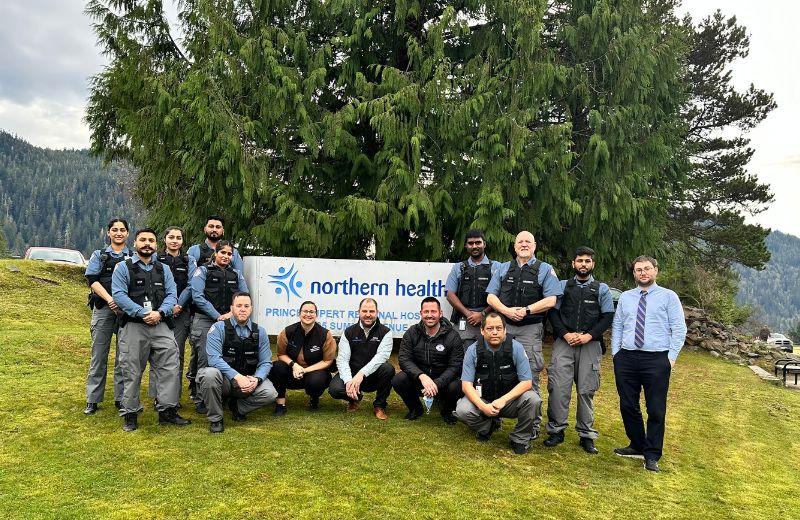In September, the first “class” of Northern Health Relational Security Officers (RSOs) officially completed their training at the University Hospital of Northern BC (UHNBC) in Prince George.
In October, Mills Memorial Hospital (MMH) in Terrace and Prince Rupert Regional Hospital (PRRH) saw their own “first classes” of RSOs complete their training and begin their new roles at the two hospitals.
Six months after the launch of the program, Charles Leblanc, NH’s Coordinator, Protection Services, shares an update on some of the work that’s been happening locally at PRRH.
How many RSOs are located in Prince Rupert?
There are four full-time supervisor positions and nine full-time Relational Security Officer positions at Prince Rupert Regional Hospital. We're also consistently recruiting to our team, including full-time and casual positions. To explore NH job listings, visit our Careers website.
How's the Protection Services pilot project going?
The pilot is going well. RSOs have assisted in preventing violence through preventative patrols, officer presence, and responding to minor and more serious calls such as Code White [violent behaviour] in both PRRH and Acropolis Manor. Our team has also provided Safe Walk escorts to employees and visitors at all hours of the day.
How have RSOs been collaborating with staff on-site?
Relational Security introduced a Safe Walk Program and has connected with departments where clinical staff are called in after hours, or other staff members who work alone. Staff in areas like Diagnostic Imaging and Laboratory check in with Relational Security when called in after hours so that RSOs can check on them throughout their shifts. Some food service staff have an early start time, so Relational Security conducts patrols in the area and greets them when they arrive. RSO's also attend patient bed meetings as a way to collaborate with clinical staff and to have a better understanding of the intricate care needs of our patients.
What is the RSO training like?
All the RSOs complete 255 hours of training with increased focus on trauma-informed care, reducing stigma, and cultural safety/humility, as well as comprehensive training in the provincial Violence Prevention curriculum, Advanced Team Response, and Use of Force. This includes classroom training and field training, which is completed on site with a field trainer/coach.
Are RSOs getting additional training?
Relational Security Officers have access to courses on the Learning Hub (a province-wide course registry and learning management system for health care) and a curriculum has been developed for continuing education within the first six months. In addition, we have begun providing Gentle Persuasive Approaches (GPA) in Dementia Care education for Relational Security to equip them for their interactions with people with dementia or brain injuries.
How do RSOs help patients/clients?
Relational Security has maintained a presence at the main entrance to assist with wayfinding. For example, people who may need this service include maternity patients, people who are there for an appointment with a specialist, and people there to visit with a patient. They also provide information about alternatives such as Telehealth to those who may be seeking emergency care. This also frees up clinical staff so they can attend to clinical duties rather than screening at the entrance.
We’d like to express our gratitude to our RSOs and Protection Services staff – their roles are so important for the safety of our staff and the people we care for!














Comments